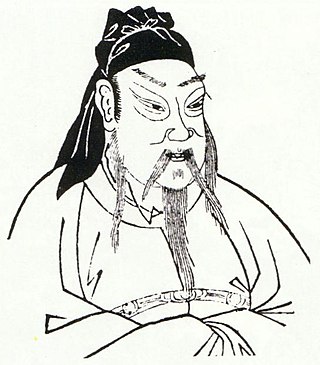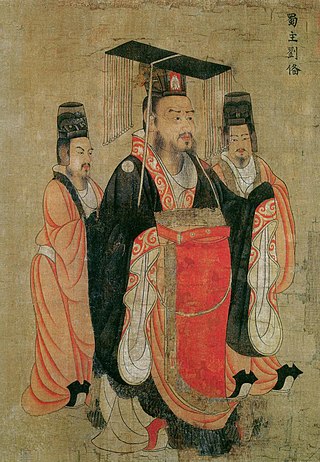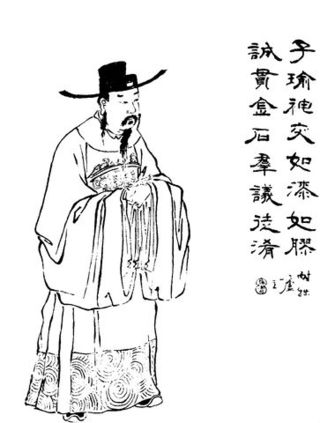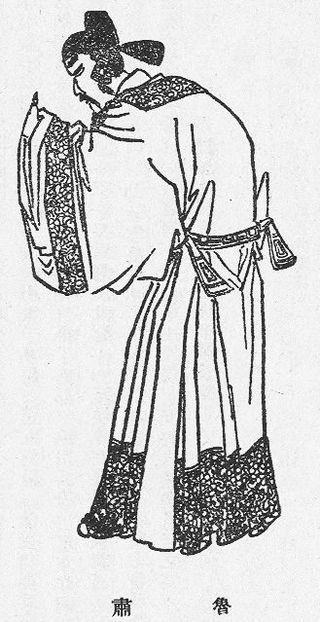Related Research Articles

Guan Yu, courtesy name Yunchang, was a Chinese military general serving under the warlord Liu Bei during the late Eastern Han dynasty of China. Along with Zhang Fei, he shared a brotherly relationship with Liu Bei and accompanied him on most of his early exploits. Guan Yu played a significant role in the events leading up to the end of the Han dynasty and the establishment of Liu Bei's state of Shu Han during the Three Kingdoms period. While he is remembered for his loyalty towards Liu Bei, he is also known for repaying Cao Cao's kindness by slaying Yan Liang, a general under Cao Cao's rival Yuan Shao, at the Battle of Boma. After Liu Bei gained control of Yi Province in 214, Guan Yu remained in Jing Province to govern and defend the area for about seven years. In 219, while he was away fighting Cao Cao's forces at the Battle of Fancheng, Liu Bei's ally Sun Quan broke the Sun–Liu alliance and sent his general Lü Meng to conquer Liu Bei's territories in Jing Province. By the time Guan Yu found out about the loss of Jing Province after his defeat at Fancheng, it was too late. He was subsequently captured in an ambush by Sun Quan's forces and executed.

Liu Bei, courtesy name Xuande (玄德), was a Chinese warlord in the late Eastern Han dynasty who later became the founding emperor of Shu Han, one of the Three Kingdoms of China.

Lü Meng, courtesy name Ziming, was a Chinese military general and politician who served under the warlord Sun Quan during the late Eastern Han dynasty of China. Early in his career, he fought in several battles under the banner of Sun Ce, Sun Quan's elder brother and predecessor. Although he had been noted for his bravery, he was still deemed as nothing more than a "mere warrior" for his lack of literacy skills. Later, with encouragement from Sun Quan, Lü Meng took up scholarly pursuits to improve himself, gradually becoming a learned and competent military leader. In 217, he succeeded Lu Su as the frontline commander of Sun Quan's forces in Jing Province. Two years later, in a carefully calculated military operation, Lü Meng led an invasion of Liu Bei's territories in southern Jing Province, swiftly and stealthily capturing all the lands from Liu Bei's general Guan Yu, who was captured and executed after his defeat. Lü Meng enjoyed his finest hour after the victory but died a few months later because he was already seriously ill before the campaign.

Gan Ning, courtesy name Xingba, was a Chinese military general serving under the warlord Sun Quan in the late Eastern Han dynasty. Originally a notorious pirate, he gave up the life of a marauder in the late 190s and became a subordinate of Huang Zu, the Administrator of a commandery in present-day east-central Hubei. Disheartened by Huang Zu's indifferent attitude towards him, Gan Ning eventually left Huang and made his way into Wu territory, where he found his calling and became a military officer under the warlord Sun Quan. Throughout his years of service under Sun Quan until his death, Gan Ning fought in numerous battles for his lord, including the battles of Jiangxia (208), Red Cliffs (208–209), Xiaoyao Ford (214–215) and Ruxu (217).

Zhou Yu (175–210), courtesy name Gongjin, was a Chinese military general and strategist serving under the warlord Sun Ce in the late Eastern Han dynasty of China. After Sun Ce died in the year 200, he continued serving under Sun Quan, Sun Ce's younger brother and successor. Zhou Yu is primarily known for his leading role in defeating the numerically superior forces of the northern warlord Cao Cao at the Battle of Red Cliffs in late 208, and again at the Battle of Jiangling in 209. Zhou Yu's victories served as the bedrock of Sun Quan's regime, which in 222 became Eastern Wu, one of the Three Kingdoms. Zhou Yu did not live to see Sun Quan's enthronement, however, as he died at the age of 35 in 210 while preparing to invade Yi Province. According to the Records of the Three Kingdoms, Zhou Yu was described as a strong man with beautiful appearance. He was also referred to as "Master Zhou". However, his popular moniker "Zhou the Beautiful Youth" does not appear in either the Records or the 14th-century historical novel Romance of the Three Kingdoms. Some Japanese writers such as Fumihiko Koide believe that this was a later invention by Japanese storytellers such as Eiji Yoshikawa.

Zhang Fei, courtesy name Yide, was a Chinese military general and politician serving under the warlord Liu Bei in the late Eastern Han dynasty and early Three Kingdoms period of China. Zhang Fei and Guan Yu, who were among the earliest to join Liu Bei, shared a brotherly relationship with their lord and accompanied him on most of his early exploits. Zhang Fei fought in various battles on Liu Bei's side, including the Red Cliffs campaign (208–209), takeover of Yi Province (212–214), and Hanzhong Campaign (217–218). He was assassinated by his subordinates in 221 after serving for only a few months in the state of Shu Han, which was founded by Liu Bei earlier that year.

Zhuge Jin, courtesy name Ziyu, was a Chinese military general and politician of the state of Eastern Wu during the Three Kingdoms period of China. Born in the late Eastern Han dynasty, Zhuge Jin started his career in the 200s as an official under the warlord Sun Quan, who later became the founding emperor of Eastern Wu in the Three Kingdoms period. In 215, he served as Sun Quan's representative in a territorial dispute over southern Jing Province between Sun Quan and his ally, Liu Bei. In 219, he joined Sun Quan's general Lü Meng in an invasion of Liu Bei's territories in Jing Province after Sun Quan broke the Sun–Liu alliance. He was subsequently appointed as a general and commandery administrator. Before the Battle of Xiaoting of 221–222, Zhuge Jin attempted to dissuade Liu Bei from going to war with Sun Quan but was unsuccessful. The battle ultimately concluded with victory for Sun Quan's side; both sides made peace later and reestablished an alliance between the Eastern Wu and Shu Han states against their rival state, Cao Wei. From 222 until his death in 241, despite being rather incompetent in military affairs, Zhuge Jin served as one of Eastern Wu's top generals and participated in some battles against Cao Wei forces.

Zhang Zhao (156–236), courtesy name Zibu, was a Chinese calligrapher, essayist, military general, and politician. He served as an official of the state of Eastern Wu during the Three Kingdoms period of China. Born in the late Eastern Han dynasty, Zhang Zhao started his career as a scholar in his native Xu Province before the chaos towards the end of the Eastern Han dynasty forced him to flee south to the Jiangdong region for shelter. In Jiangdong, Zhang Zhao became an adviser to the rising warlord Sun Ce. After Sun Ce's death in the year 200, Zhang Zhao played a key supporting role to Sun Ce's younger brother and successor, Sun Quan, as he consolidated power and his control over the Jiangdong territories. In 208, Zhang Zhao strongly urged Sun Quan to surrender to Cao Cao, a rival warlord, because he believed that they stood no chance against an impending invasion by Cao Cao. However, Sun Quan refused to listen to Zhang Zhao and instead heeded the advice of Lu Su and Zhou Yu. Sun Quan's forces ultimately scored a decisive victory over Cao Cao at the Battle of Red Cliffs in the winter of 208. From 200 until his death in 236, Zhang Zhao served under Sun Quan through the collapse of the Eastern Han dynasty and into the Three Kingdoms period after Sun Quan became the founding emperor of the Eastern Wu state. Throughout his career, Zhang Zhao was known for being a stern, uncompromising and intimidating figure who commanded respect from both his colleagues and Sun Quan. Despite Zhang Zhao's seniority and experience, Sun Quan passed him over twice as a candidate for the position of Imperial Chancellor in 222 and 225 as he believed that Zhang Zhao was so headstrong and stubborn that he would not be able to effectively lead the administration. Nevertheless, Sun Quan paid his due respects to Zhang Zhao as a mentor-like figure who saw him through his formative years to his accession to the throne.

Lu Su (172–217), courtesy name Zijing, was a Chinese military general and politician serving under the warlord Sun Quan during the late Eastern Han dynasty. In the year 200, when Sun Quan had just taken over the reins of power, his adviser Zhou Yu recommended Lu Su as a talent to Sun Quan. As one of Sun Quan's most important advisers in the warlord's early career, Lu Su is best known for making some significant contributions. Firstly, in 200 he drafted a long-term strategy for Sun Quan's power bloc to emerge as one of three major contending powers in China – a plan similar to Zhuge Liang's Longzhong Plan, which was proposed about seven years later. Secondly, before the Battle of Red Cliffs in late 208, he was the first person to persuade Sun Quan to ally with Liu Bei against Cao Cao. Thirdly, he succeeded Zhou Yu as the frontline commander of Sun Quan's forces in 210 after Zhou's death and maintained the Sun–Liu alliance. Fourthly, in 215, he represented Sun Quan at the negotiations with Liu Bei's general Guan Yu during the Sun–Liu territorial dispute over Jing Province.

Pang De, courtesy name Lingming, was a Chinese military general who lived during the late Eastern Han dynasty. He started his career under the warlord Ma Teng, who was based in Liang Province. In 211, Ma Teng's son Ma Chao, along with a coalition of warlords from Liang Province, started a rebellion against the Han central government, which was controlled by the warlord Cao Cao. After Cao Cao defeated Ma Chao and the coalition at the Battle of Tong Pass, Ma Chao fled to Hanzhong Commandery and took shelter under the warlord Zhang Lu. Pang De accompanied him to Hanzhong. When Ma Chao defected from Zhang Lu's side in order to join the warlord Liu Bei, Pang De remained in Hanzhong and eventually came to serve Cao Cao after Cao Cao defeated Zhang Lu at the Battle of Yangping and took over Hanzhong. In 219, Pang De fought at the Battle of Fancheng under Cao Ren's command against Liu Bei's forces led by Guan Yu. Pang De was captured in battle and eventually executed by Guan Yu when he refused to surrender.

Pang Tong (179–214), courtesy name Shiyuan, was a Chinese politician who served as the key adviser to the warlord Liu Bei in the late Eastern Han dynasty of China. In his youth, Pang Tong was disregarded because he was plain-looking. Sima Hui, however, held him in high esteem and called him the "Crown of Scholars in Jing Province". Pang Tong studied under Sima Hui along with Zhuge Liang, Xu Shu and Xiang Lang, and he was given the nickname of "Fledgling Phoenix". Because of his friendly attitude, he worked as an appraiser in Nan Commandery. When reviewing someone, he would prioritize their virtue over their abilities and would encourage them to help others.
Lady Wu, personal name unknown, was a Chinese noble lady, aristocrat and posthumously honoured as Empress of Eastern Wu state. She was the wife of the warlord Sun Jian, who lived during the late Eastern Han dynasty of China. She bore Sun Jian four sons and a daughter – Sun Ce, Sun Quan, Sun Yi, Sun Kuang and Lady Sun. She was posthumously honoured as Empress Wulie in 229 by her second son Sun Quan, who became the founding emperor of the state of Eastern Wu in the Three Kingdoms period.

Xun You, courtesy name Gongda, was a statesman who lived during the late Eastern Han dynasty of China and served as an adviser to the warlord Cao Cao. Born in the influential Xun family of Yingchuan Commandery, Xun You was recruited into the civil service by the general He Jin. When the warlord Dong Zhuo hijacked and controlled the Han central government between 189 and 192, Xun You plotted with four others to assassinate him but was discovered and imprisoned. Following his release after Dong Zhuo's death, he wanted to serve as the Administrator of Shu Commandery but eventually settled as an official in Jing Province.
Man Chong, courtesy name Boning, was a Chinese military general and politician of the state of Cao Wei during the Three Kingdoms period of China. He previously served under the warlord Cao Cao during the late Eastern Han dynasty. He is best known for defending the city of Hefei from a series of invasions by Wei's rival state, Eastern Wu, between 230 and 235.

Cao Hong, courtesy name Zilian, was a Chinese military general of the state of Cao Wei during the Three Kingdoms period of China. He started his career in the late Eastern Han dynasty under the warlord Cao Cao, who was his older second cousin.
Yu Fan, courtesy name Zhongxiang, was a Chinese essayist, politician, and writer of the state of Eastern Wu during the Three Kingdoms period of China. Initially a minor officer under Wang Lang, the Administrator of Kuaiji Commandery, Yu Fan later served under the warlord Sun Ce, who conquered the territories in the Jiangdong region in a series of campaigns from 194 to 199. Sun Ce regarded him highly and once enlisted his help in persuading Hua Xin, another commandery administrator, to surrender. After Sun Ce's death, Yu Fan continued serving under Sun Quan, Sun Ce's younger brother and successor, as a Cavalry Commandant. Sun Quan confined him for some time due to his rude and disrespectful behaviour, but released him in 219 and allowed him to accompany the general Lü Meng to attack Jing Province. During the Jing Province campaign, Yu Fan warned Lü Meng about a possible ambush when Lü Meng was celebrating a minor victory, and was proven right later.
Sun Kuang, courtesy name Jizuo, was a younger brother of Sun Quan, a Chinese warlord who lived during the late Eastern Han dynasty and became the founding emperor of the state of Eastern Wu in the Three Kingdoms period.
Liu Ba, courtesy name Zichu, was an official in the state of Shu Han during the Three Kingdoms period of China. He originally served under the warlord Liu Zhang before becoming a subordinate of Liu Bei after Liu Zhang's surrender to Liu Bei in 214. Liu Ba was instrumental in helping Liu Bei reward his subordinates from the treasury without impoverishing the common people after their conquest of Yi Province. Liu Ba also helped write the Shu Ke (蜀科), the legal code of Shu, along with Zhuge Liang, Fa Zheng, Li Yan and Yi Ji. Liu Ba succeeded Fa Zheng as the Prefect of the Masters of Writing in 220 and held office until his death in 222.
Liu Bei's takeover of Yi Province was a military campaign by the warlord Liu Bei in taking control of Yi Province from the provincial governor, Liu Zhang. The campaign took place between the years 211 and 214 in the late Eastern Han dynasty; although the conflict between Liu Bei and Liu Zhang started in January or February 213 when the latter discovered the former secret communications and subsequently executed Zhang Song. It concluded with victory for Liu Bei and his successful takeover of the province from Liu Zhang in July 214. Yi Province would serve as the foundation of the state of Shu Han during the Three Kingdoms period.
The following is the order of battle for the Battle of Red Cliffs.
References
- ↑ (江表傳曰: ...) Jiang Biao Zhuan annotation in Sanguozhi vol. 54.
- ↑ (幹有儀容,以才辯見稱,獨步江、淮之閒,莫與為對。) Jiang Biao Zhuan annotation in Sanguozhi vol. 54.
- ↑ (曹操密遣九江蔣幹往說周瑜。 ... 還白操,稱瑜雅量高致,非言辭所能間也。) Zizhi Tongjian vol. 66.
- ↑ (初曹公聞瑜年少有美才,謂可游說動也,乃密下揚州,遣九江蔣幹往見瑜。乃布衣葛巾,自託私行詣瑜。) Jiang Biao Zhuan annotation in Sanguozhi vol. 54.
- ↑ (瑜出迎之,立謂幹曰:「子翼良苦,遠涉江湖為曹氏作說客邪?」幹曰:「吾與足下州里,中閒別隔,遙聞芳烈,故來叙闊,并觀雅規,而云說客,無乃逆詐乎?」瑜曰:「吾雖不及夔、曠,聞弦賞音,足知雅曲也。」 ... 因延幹入,為設酒食。畢,遣之曰:「適吾有密事,且出就館,事了,別自相請。」) Jiang Biao Zhuan annotation in Sanguozhi vol. 54.
- ↑ (後三日,瑜請幹與周觀營中,行視倉庫軍資器仗訖,還宴飲,示之侍者服飾珍玩之物,因謂幹曰:「丈夫處世,遇知己之主,外託君臣之義,內結骨肉之恩,言行計從,禍福共之,假使蘇張更生,酈叟復出,猶撫其背而折其辭,豈足下幼生所能移乎?」幹但笑,終無所言。) Jiang Biao Zhuan annotation in Sanguozhi vol. 54.
- ↑ (幹還,稱瑜雅量高致,非言辭所間。) Jiang Biao Zhuan annotation in Sanguozhi vol. 54.
- ↑ Sanguo Yanyi ch. 45.
- Chen, Shou (3rd century). Records of the Three Kingdoms (Sanguozhi).
- Luo, Guanzhong (14th century). Romance of the Three Kingdoms (Sanguo Yanyi).
- Pei, Songzhi (5th century). Annotations to Records of the Three Kingdoms (Sanguozhi zhu).
- Sima, Guang (1084). Zizhi Tongjian .